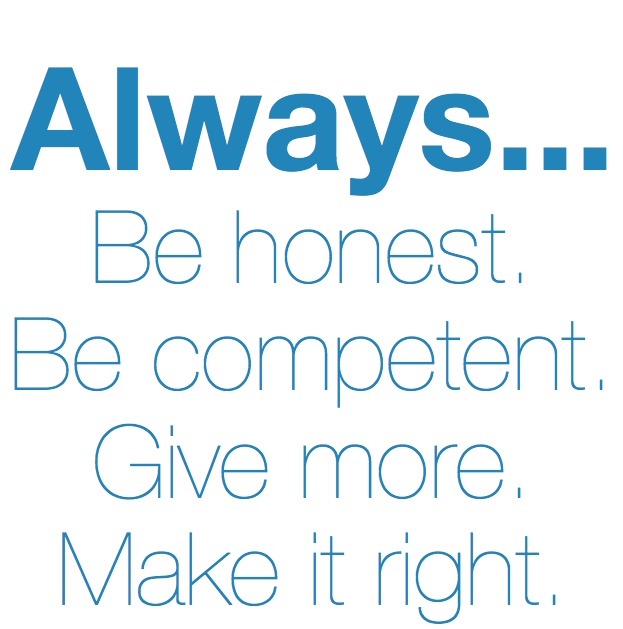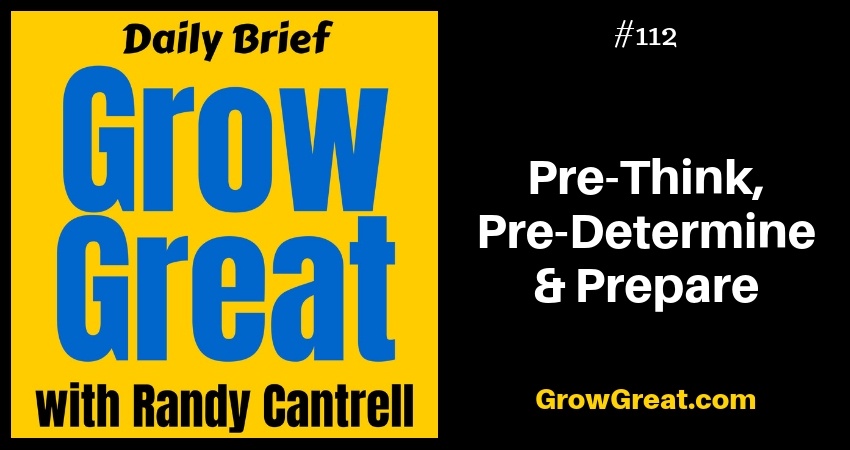Podcast: Play in new window | Download (Duration: 15:18 — 14.5MB)
Subscribe: Apple Podcasts | Spotify | RSS | More
Wise parents begin to instill into their elementary school kids how to behave and react to influences they may have yet to encounter. We want our kids to be prepared for dealing with things like drugs, alcohol and sex. And it’s not just a fear-driven agenda we’re fulfilling. It’s practical.
As parents, we know the value of facing something ahead of time. Driven by our love of our kids, and our desire to protect them, and arm them with as much wisdom as we can — we engage in conversations where we discuss the various scenarios they’re likely to encounter. We rehearse how they should react when these situations happen. Our hope and goal are that they’ll remember these conversations and respond with wisdom. In short, we don’t want them to be caught off guard.
Why don’t we do that more with our own lives…and our businesses?
Pre-think? Pre-determine? And then prepare accordingly?
Complacency. That’s the biggest reason. We get into the routine of life going the way it goes. So we don’t think about something disrupting it.
Avoidance. Another big reason. We don’t enjoy thinking about the negative things that could happen. Think about all the financially successful people who die without having their affairs in order. Even people who may have been suffering from ill health. Largely we want to avoid considering bad outcomes.
Let’s end the week by getting real. You’ll thank me. I promise.
I Learned The Hard Way
As a young leader I had to figure some things out after being smacked in the face with a really bad situation. I’d love to tell you it only happened once or twice, but life is happy to hit you in the face as often as possible. I endured my fair share of punches. Thankfully, none were fatal.
I once had a manager working for me who I really liked. I had recruited him from a vendor I once dealt with. He was likable and seemed to have the right demeanor for the job. It was the early 80’s. That’s important for the context.
One day somebody discovered a stash of marijuana in his office. I was stunned. Stunned that he’d have it at work. Sort of stunned that he was smoking pot. (Years later we’d all call it “weed”) 😉
I’m not naive. I’ve never smoked pot, or even had a drink of alcohol, but I’ve been around it more than I care to admit, especially in high school. But we were grown guys, admittedly still young – me in my mid-20’s and him in his 30’s. And like I said, it was the early 80’s…quite unlike today where the cannabis industry is on the verge of booming.
I remember thinking how I hadn’t come to work that day expecting to part ways with him and now make finding his replacement my number 1 activity. But here I was having to do both. I wished I had seen it coming. I wished I had known. I wished he hadn’t brought it to work. I even wished somebody hadn’t found it. He apologized profusely for having it, but the damage was done.
Mostly, I wished I had prepared so I would have had a contingency plan. I was completely unprepared. It was my fault.
It wasn’t my last punch to the gut, or mouth. Over the years I learned to play as many “what if” scenarios as possible…because most anything IS possible. Without being a Negative Nellie you can prepare for the biggest disasters possible. Playing them out in your head isn’t quite the same as dealing with the real thing, but it sure makes decision making easier when you’ve at least considered the possibility beforehand.
Pre-Think
My preference may not be yours, but I’ll share it in hopes you find value.
I prefer to pre-think by myself first. I used to do this by trying to intentionally think of the worst thing that could happen to me as a leader. I stopped doing that because it seemed to bog me down. Instead, I just start thinking of all the bad things that could happen. I still do what I’ve always done – I begin with PEOPLE. That’s probably because as a young leader those were where most of my gut punches came. And also because replacing key people is such a daunting task (and time-consuming).
I brainstorm all the various things that could erupt in a moment. What if a text or phone call came delivering me this news? What if somebody walked into my office and quit? I barrage myself with questions like that and write them down. I don’t worry about ranking them. What’s the point? They’re all bad. They all will demand elevated time and attention. Most of them will obliterate my schedule.
I don’t fret about ones that won’t do that. There are bad things that can happen that are more easily deflected. Not every punch is solid. Or to the gut or face. Some hit you on the arm. Others are glancing blows. I don’t sweat any of those. Things happen and we deal with them rather quickly because they’re inconvenient, but they’re not completely disruptive.
I focus on the disruptive ones.
I’ll ask the leadership team to do the same thing. Each of them pursues their answers in whatever way best suits them.
As CEO or owner you aren’t going to likely share your entire list with your team – after all, part of your list may include one or more of them walking in and resigning. But you can come together with your team to discuss the lists each of you has compiled to pre-think where you feel vulnerable.
Pre-Determine
Next, I focus on answering one question: “What can we do to better protect ourselves from this possibility?”
If this negative thing were to happen, is there something we could do in advance to soften the blow? If we want our kids to turn down offers by their friends to steal and drink liquor from a friend’s parents’ liquor cabinet, then we openly talk about it. We may suggest they just leave. If they’re unable to leave, we may suggest they say no to their friends and call us so we can come get them. Whatever your answer is for facing such an inevitability, that’s what you’re pre-determining. It’s a pre-determination because it hasn’t happened yet, but you suspect it may. Or you know it could. That’s exactly what we’re doing with regard to our company.
Make up your mind in advance. Some things will be easier than others. As you figure these things out, some things will be far more cut and dried than other things.
I had to deal with fist fights in the workplace before. Well, I had pre-determined that I wouldn’t tolerate any violence. Period. Generally, I felt good about that pre-determination. Until one employee was attacked by another employee and he defended himself. By all accounts, the verbal abuse began by the attacker. The other worker, attempting to ignore the escalation, began to walk away. The verbal abuser attacked him from behind, at which point the victim beat the ever-living snot out of the attacker.
After talking with employees, getting written statements and interviewing each employee I was happy that I had pre-determined what I might do if a fight ever broke out at work between 2 or more employees. What I had NOT pre-determined was what I’d do if one person was justified and one wasn’t. But that wasn’t any kind of a stretch for me. I terminated the attacker and retained the defender.
The details may not always be exactly as you pre-thought them, but that pre-thinking and the pre-determining will still help you figure it out more quickly in the moment.
Prepare
Here’s where the action plan gets crafted. This is where you figure out if Bob suddenly quits, who will replace him. You begin to look at the org chart to see if you’ve got people on your roster who can step up and fill in. You can begin to look at potential candidates outside the company. You won’t know how available they may be without talking with them, which isn’t likely something you’d want to do. But you can at least create a short list of possible candidates. Apply that same approach to whatever “what if” scenarios are on your list. Some will be more difficult than others. Don’t avoid dealing with them.
Don’t allow complacency and avoidance to rule. They will unless you lead an intervention. Your team and your company deserve every protection you can provide. Just like our children do. We love our companies. We love our employees. We love our customers. We want what’s best for all of them so we have to put in the work.
I’ll end by telling you that decades ago it was this kind of exercise that influenced me to craft what I called my business philosophy.

At the time companies were riding the trend of creating a corporate mission statement. I mostly found them hokey and useless. And I wanted something more personal and in line with how I most wanted to behave. It morphed into what I most wanted my people to embrace, too.
I intentionally wanted it to be concise and actionable. I also wanted it to be as absolute as I could make it because I realize there are so few absolutes. Kind of like my general rule of not allowing any workplace violence…there are often shades of grey to manage. But I was able to distill four areas where I felt comfortable and confident establishing absolutes.
You may also find value in working through the exercises of pre-thinking, pre-determining and preparing then crafting your own statement. It brings clarity and helps convey the things that matter most.
Before I go and end the week I want to make an overt offer to every business owner in the United States. I’m currently enrolling (recruiting may be a more blunt term) business owners into The Peer Advantage by Bula Network. It’s a 7-member professional peer advisory group comprised of business owners from around America. We’ll meet twice a month using a video conferencing platform, making it super convenient. It’s reasonably priced and I can promise you it’ll be among the highest ROI things you can do for yourself and your company. You can find all the details at ThePeerAdvantage.com, but let’s jump start things by having a conversation. Go to BulaNetwork.com/apply and complete that short form. You’ll plug in some vital information to help me better understand you and your company, then we’ll schedule a time to have a phone conversation. I want you to take advantage of this because the value of business owners sharing experiences and helping each other is profoundly life-changing. So please go apply today.
Be well. Do good. Grow great!

 About the hosts: Randy Cantrell brings over 4 decades of experience as a business leader and organization builder. Lisa Norris brings almost 3 decades of experience in HR and all things "people." Their shared passion for leadership and developing high-performing cultures provoked them to focus the Grow Great podcast on city government leadership.
About the hosts: Randy Cantrell brings over 4 decades of experience as a business leader and organization builder. Lisa Norris brings almost 3 decades of experience in HR and all things "people." Their shared passion for leadership and developing high-performing cultures provoked them to focus the Grow Great podcast on city government leadership.
The work is about achieving unprecedented success through accelerated learning in helping leaders and executives "figure it out."
